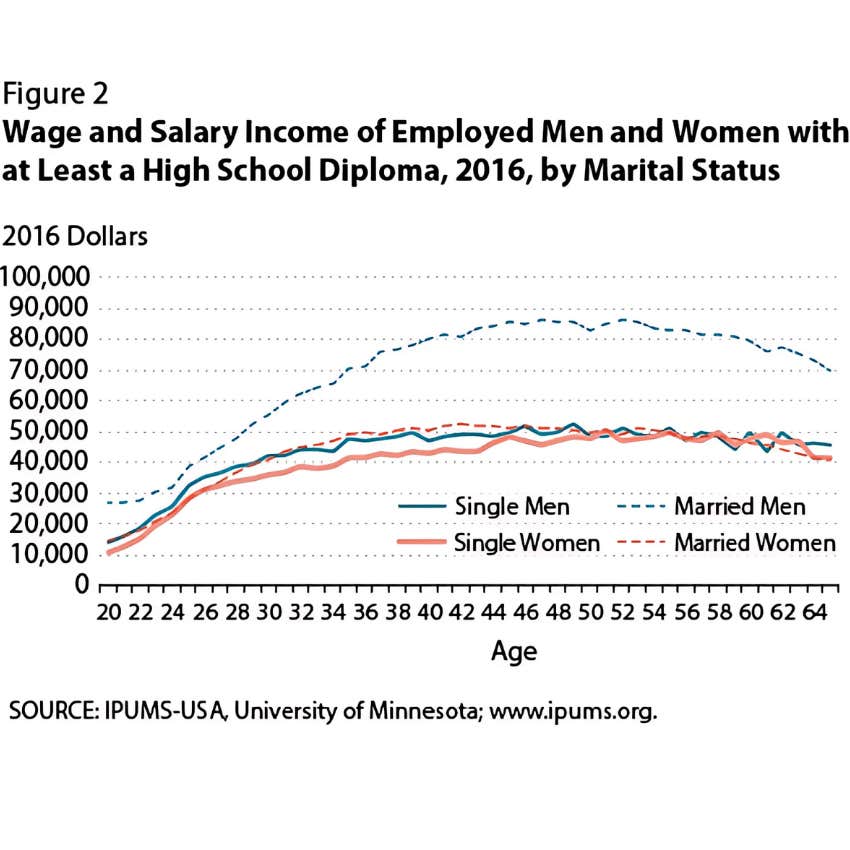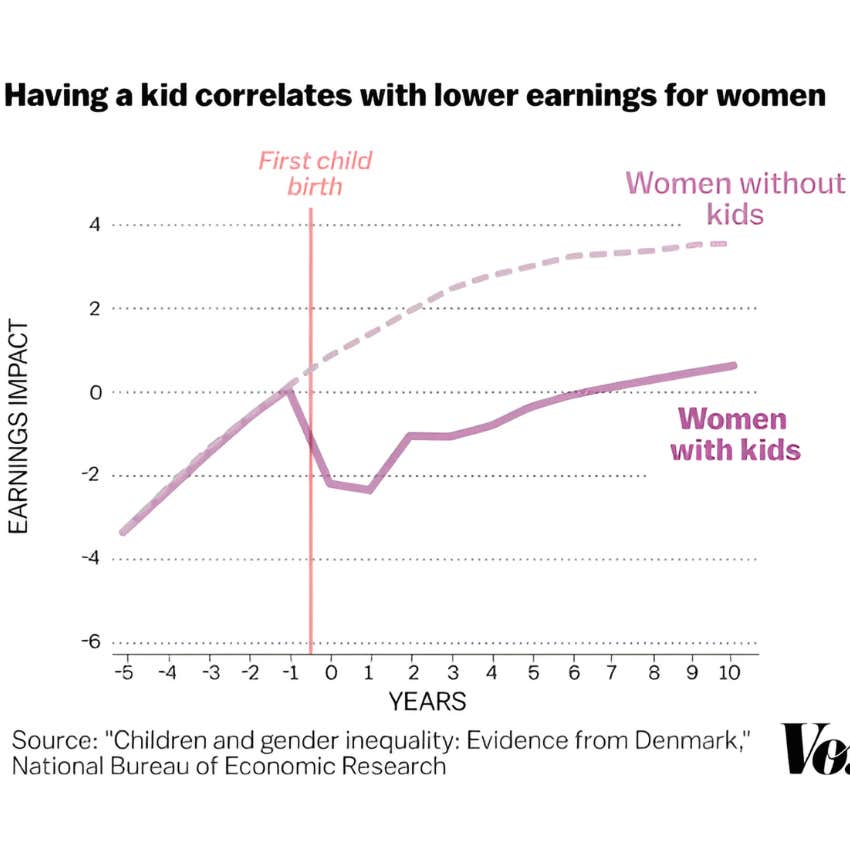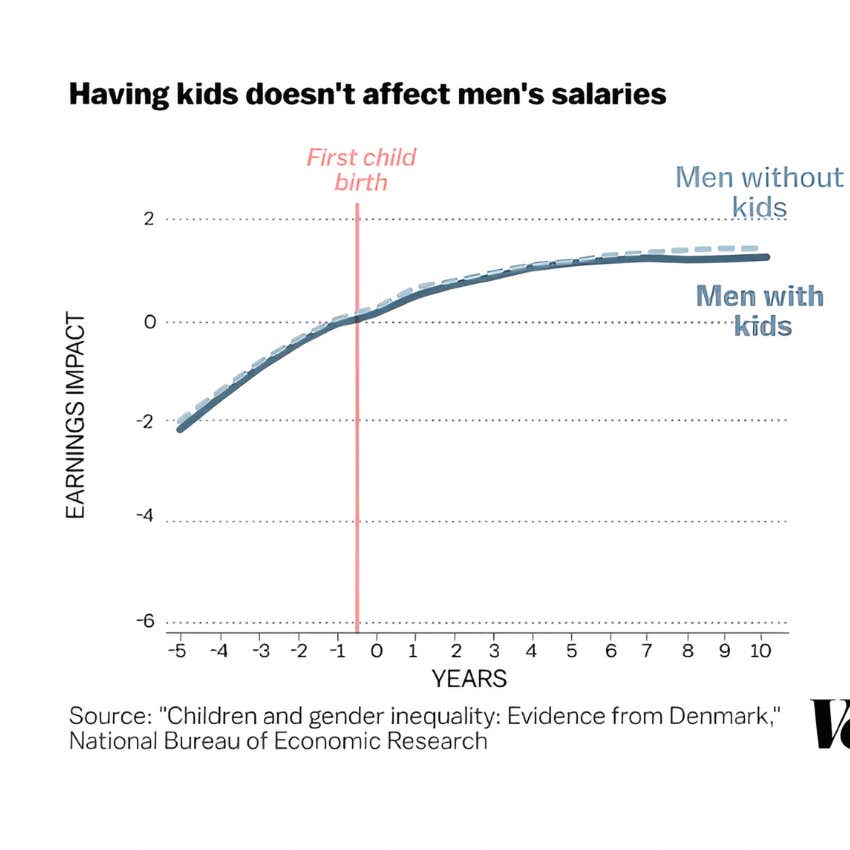The Real Reason Married Men Earn $35,000 More Than Everyone Else, According To Research
There are three widely shared theories for why men get such a substantial income boost.
 Monkey Business Images | Canva
Monkey Business Images | Canva It’s well known that married men earn more than their single counterparts, and married women do as well, but the net benefit for men is much higher — $35,000 versus a few thousand dollars. There are three widely shared theories for why men get such a boost.
The first is that women select high-earning men. As such, the net benefit to married men is an illusion born through natural selection. The second is that marriage makes men more productive, and the third is that women make high-earning men by doing household labor for them.
The latter has been largely debunked as it has been found to only make a slight difference, which considering data shows married men do a similar amount of household labor as single men, is perhaps not surprising. However, the former two are more complex, and are what make this subject interesting to discuss.
Why married men earn $35K more a year is complex
In the US, at age 45, a single woman, on average, earns $48,095, and a single man $49,754. Statistically speaking, these figures are close enough to be treated as the same.
However, at the same age, whereas a married woman earns on average $51,384, which is slightly above that of single men and women, a married man earns on average $85,233. This is, like I said, yup, $35,000 more than everyone else. What is interesting, though, is the graph below:
 IPUMS-USA, University of Minnesota
IPUMS-USA, University of Minnesota
Note how at every age range, the married man is earning more than everyone, which tells us one very specific thing: married men earn more than everyone before they get married.
This can be seen when looking at cohabiting data. For example, in the United Kingdom, whereas married men typically earn a third more than single men, men cohabiting with a partner earn, on average, 15 to 20 percent more than single men.
Not only that, but they work to increase their wages. This is why if you look at men’s wages and working hours in the run-up to them getting married, both increase substantially, i.e., it seems men increase their working hours to get married.
What is interesting is the data is pretty much universal across the developed world. That tells us the reason single men earn less than married men is that men who earn a lot more tend to get into relationships and marry quite quickly, taking their figures out of the statistics.
In terms of why this might be, the answer is fairly obvious: most women who want to get married typically desire to have a family, so children.
Children are expensive — especially for women
Everybody knows about the motherhood tax, which exists even in the most gender-equal countries, so the Nordic ones.
In fact, in Denmark, it is estimated to account for 80 percent of the gender wage gap, which can perhaps be best expressed from the following graphs:
 National Bureau of Economic Research | Vox
National Bureau of Economic Research | Vox
 National Bureau of Economic Research | Vox
National Bureau of Economic Research | Vox
It doesn’t take a rocket scientist to know why the moment a woman has a child, her earnings take a hit, but men’s don’t. It’s just basic biology. The woman has to carry the child, and because of this, most women want to be the ones focused on them — in the first year especially.
This is why, even when married couples are given the option of sharing parental leave, they typically don’t, and the wife takes it all.
It is also why Claudia Goldin, who won a Nobel Prize for her research into the gender pay gap, identified as the key behind the gender wage gap, women’s preferences rather than inequality.
Yup, after studying the gender gap for decades, she found that the reason it still exists is not the patriarchy or inequality but women making the choice to step back and focus on the children because they want to.
I know, probably stating the obvious. But bringing all this together, what this tells us is that if a woman desires to get married and have children, first and foremost in her mind will be finding a partner who she believes can and will support her while she spends a few years or more getting pregnant and having the children.
Even if she intends to continue working full time, not having the pressure of having to, and knowing you can keep up the same lifestyle even if you don’t if your children need you, is an extremely attractive thing. That means a large part of the apparent marriage benefit to men is an illusion born through the fact women are more likely to marry high-earning men so they can have children.
But this doesn’t explain why the disparity is so high, and nor does it explain why married women earn more than single women. After all, married women are the most likely to have children, so why do the motherhood tax and the increased household labor that comes with marriage give them an earnings boost over single women?
 Mohamed hamdi | Pexels
Mohamed hamdi | Pexels
Why married women earn more than single women
A simple answer to explain why married women earn more than single women would be the single motherhood penalty. For example, single women without children earn more than married women with children. Single women without children come second behind married men in the earnings rankings.
However, it turns out not to have anything to do with single motherhood, as studies have taken these factors into account and found that married women without children earn more than single women without children, according to the Journal of American Economic Review. That means marriage still gives women a net positive.
It should be noted that the net positive is only small, and some studies argue it could be down to educational differences and other factors, a 2020 Journal of Social Science Research, but it does seem to exist and to be on the rise.
That means it is becoming increasingly clear that marriage provides a net income positive for women — just as it does men. In terms of the potential factors, we need to first look at why it can benefit men so much.
The main reasons marriage boosts men’s income
One thing every wife knows is that she has the power to boost her husband’s workplace productivity. She can do this by taking on more of the household labor. Stating the obvious, D’uh. She may do this not per se for love or even because of the patriarchy but because it benefits her.
Yup, if a wife can increase her partner’s earnings, she will increase the potential safety net from her partner should she ever want or need to drop off from work and focus on the children. That means paradoxically, women taking up the household flak to help their husband’s income is as beneficial to them as their husbands, which is likely one reason — if not the main — why so many women end up doing it.
However, the boost is typically only a few percentage points. This brings me to the second factor that benefits married men’s earnings: discrimination against non-married men, according to the Federal Reserve Bank of St. Louis. You read that right; there is firm evidence that single men are discriminated against when it comes to job interviews, promotions, and wage increases, with their married counterparts favored over them — perhaps because married men are deemed more reliable.
It’s not known just how much this discrimination costs single men and boosts married men — one 2020 study by the Journal of Marriage and Family found it to be in the several percentage points mark — but it very much does appear to exist and play a part. The third factor that benefits married men is that when children are born in marriage, men typically end up working more hours to compensate for their wives spending more time with the children.
That means the men take up the work flak to keep the family’s standard of living at the level it was when the wife was working full-time. This can be seen in the data; for example, married men typically work 4.6 hours more per week than men who have never married and 6.7 hours more than women who have never married.
Inevitably, all these extra hours boost men’s careers, not just through short-term income increases but also from future promotion opportunities. It should be noted women also can get this boost if the roles are reversed, but this mostly favors men due to women’s preferences, as do all of the aforementioned points.
According to a report by the Pew Research Center, this can be best seen in the data, which shows married men with children under 18 often work twice as many hours per week in the workplace as their wives. This, of course, begs the question of how married women can earn more than single women, two main reasons.
 Mikhail Nilov | Pexels
Mikhail Nilov | Pexels
The two big factors boosting the income of wives
Marriage provides one thing that no single person can ever have, and that is a safety net. Yup. Let’s say a woman is made redundant if she is single; she is probably going to have to take the first job she can get.
However, if she has a husband to give her a safety net, she can take her time and even take a career risk. That provides an opportunity for an earnings boost over the long term.
And not the only one, let’s say a woman is unhappy with her job, she doesn’t think it’s going to take her anywhere earnings-wise. If she is single, it will be much harder for her to do anything about this, mainly because if she wants to change careers or even start up her own business, the short-term earnings hit can be high.
Step forth again the husband, who can provide a safety net to allow her to take those risks. Inevitably, this again opens up the wife to higher future earnings. It should be noted that women can do this for their husbands as well, but considering women are the more risk averse, the safety net likely gives wives more of a net boost than husbands.
Something else also gives wives’ more of a boost than husbands: shared living costs. Yup, combined, married couples can save up more money by sharing the bills, which they can then invest, and this benefits wives more often than husbands.
According to a 2023 report by the Pew Research Center, this is because husbands typically earn more than wives in 55 percent of the cases, which means married women can save up more of their own money. They also have more grounds to increase their savings via their husbands, who may give them a boost. Add all this together, and what you get is married men and women being the highest earners, and the crazy thing is it’s the wives that are on the rise.
The most likely reality is that married women earn more than their single counterparts simply because, one, marriage provides them a safety net that more often benefits their careers, and two, a dual income benefits their bank balance.
Married men, on the other hand, most likely earn more through a mixture of their wives wanting them to earn more and workplace discrimination against single men. That means rather than the patriarchy being behind married men’s superior earnings or even the motherhood tax, it’s more natural selection and workplace discrimination against single men.
Elicia Jane is a writer, therapist, mother to three children and a former performer. She is a popular writer on the writing platform Medium.

